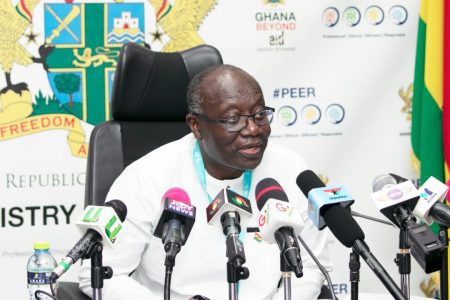Ghana and Paris Club are set to sign a Memorandum of Understanding (MoU) in the coming weeks on the terms of bilateral debt treatment.
Ghana and Paris Club to restructure over $5bn debt
This will pave the way for Ghana and Paris Club the restructure over $5 billion of debt.
Finance Minister Ken Ofori-Atta has disclosed that government has successfully worked with the Paris Club (PC) and other creditors to determine the parameters of official debt restructuring under the G20 Common Framework for Debt treatment.
He plaged that government will sustain engagements with private creditors on external debt to reach agreement with the private creditors in the shortest possible time.
Ofori-Atta made the disclosure while addressing journalists in the first of a series of press conference on Ghana’s International Monetary Fund (IMF) programme and Growth Agenda.
He said government is committed to restoring Ghana’s economic fortunes within the shortest possible time through a combination of front-loaded fiscal adjustment and structural reforms while creating the conditions for private sector-led growth.
Ghana and Paris Club on debt restructuring
He noted that despite the considerable progress, there remain key outstanding operations, especially in debt restructuring.
Cocoa bills and US dollar-denominated local bonds
He also disclosed that government is at advanced stages of completing the debt exchange programme in relation to the cocoa bills and the US dollar-denominated local bonds.
The Minister announced a programme rolled out to engage Independent Power Producers (IPPs).
Govt engaging Organised Labour, pension Funds
Consistent with the MoU signed with Organised Labour in December 2022 on the exemption of pension Funds, he said they continue to be exempted.
However, he said government is currently engaging Organised Labour and Pension Fund Corporate Trustees, in line with the MoU, to explore mutually beneficial options within debt sustainability limits and to promote macroeconomic stability and economic recovery in the spirit of social partnership.
Ofori-Atta pointed out that against a complex global economic backdrop, the economy is showing signs of stabilisation, with softening inflation, an increase in international reserves, and less volatile exchange rate
To support the effective implementation of reforms and interventions of the IMF backed PC-PEG Programme, government has put in place a clear implementation strategy.
6 thematic working groups to monitor implementation
As a result, six thematic working groups have been introduced which will meet weekly and will be chaired by the Minister of State and Deputy Ministers of the Ministry of Finance, Deputy Ministers of other relevant ministries, and Deputy Governors of the Bank of Ghana.
The groups are Energy Sector SOEs/Cocobod Structural Reforms, Public Financial Management Structural Reforms, Financial Sector Structural Reforms, Tax Policy and Revenue Administration Structural Reforms, Macro-Fiscal Policy/Reforms; and Growth and Social Protection.
Ofori-Atta reiterated government’s plans to prioritize the energy sector as part of a comprehensive host of structural reforms aimed at driving Ghana’s economic growth and development.
He emphasized the crucial role of the energy sector and reaffirmed the government’s commitment to implementing necessary reforms to ensure its efficiency and sustainability.
With legacy debt reaching a staggering $2 billion by the end of 2022, coupled with an estimated shortfall of $5.9 billion between 2023 and 2025, the country’s energy sector has been in dire need of reforms.
The Finance Minister said government will operationalize a framework for granting energy sector subsidies, implementation of an inter-utility debt settlement framework on a quarterly basis starting from June 2023, and establish a mechanism to enforce the guidelines of the Cash Waterfall Mechanism (CWM) and Natural Gas Clearinghouse (NGC) by the end of June 2023.
Ofori-Atta said these measures would contribute to reducing the estimated financial shortfall by at least $2.95 billion over the period from 2023 to 2025 by streamlining financial processes, enhance transparency, and improve cash flow management within the sector.
He emphasized that the IMF programme serves as a crucial foundation for Ghana’s economic stability and growth.
According to him, the programme provides support in terms of financing and access to additional resources, which are vital for implementing the necessary reforms.
Ofori-Atta appealed to all Ghanaians to remain committed to the agreed wide-ranging and strong structural reforms designed to address structural weaknesses and build resilience in key areas including tax policy and tax administration, expenditure commitment control and arrears clearance, financial stability, financial sector plans, review of statutory funds, governance and corruption, debt management, fiscal credibility, and energy sector/cocoa sector SOEs reformation.
He called on all Ghanaians to join hands and work together to ensure the effective execution of the reforms saying embracing the necessary changes and reforms, Ghana can create a solid foundation for sustainable economic growth and a brighter future.
He outlined the reasons behind Ghana’s decision to seek assistance from the IMF recounting the rising public debt level, worsening financing conditions, high inflation, deteriorating exchange rates, and Balance of Payment (BOP) pressures that necessitated the support from the Bretton Woods institution to restore macroeconomic stability and debt sustainability.
He said the bailout programme has had an immediate impact on Ghana’s fiscals citing the positive outcomes in various economic indicators. “Inflation has decelerated to 42.2% by the end of May 2023, down from 54.1% at the end of December 2022.
The cedi’s depreciation has largely stabilized, and the 91-Day T-Bill rate has declined.
Gross International Reserves have improved, and the current account balance has turned positive,” he explained.
He emphasized that Ghana’s recovery programme is built on clear targets and strong policy and structural measures of which over the medium term, it seeks to promote a credible fiscal consolidation programme, anchored by strong domestic revenue mobilization and high spending efficiency.
He said as a result, government is targeting a primary surplus on a commitment basis of 1.5% of Gross Domestic Product (GDP) by 2025 through to 2028.
This is said is firmly anchored on inflation expectations and preserve financial stability and restore public debt to sustainable levels by 2028 by observing the two binding constraints of Public Debt (in present value terms) to GDP ratio of 55% or less and an External Debt Service to Revenue ratio of 18 per cent or less.
He said government through its reform agenda is looking to enhance economic competitiveness, with exports surpassing 37% of GDP in the medium-term, safeguarding social protection and enhancing targeting to ensure effectiveness of key interventions and minimizing fiscal risks, including from State Owned Enterprises (SOEs) and deepening Structural Reforms in targeted sectors such as Energy and Cocoa.
- Enterprise Life launches improved education investment solution - 31 March 2025
- Access Bank Ghana launches “Fa Ketewa Bɛgye Kɛseɛ” promo - 31 March 2025
- President Mahama Calls for unity at Eid Al-Fitr celebration - 31 March 2025

